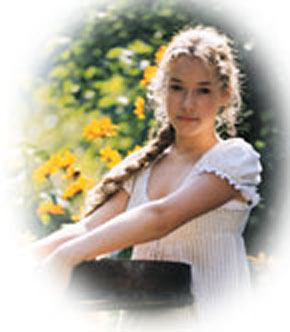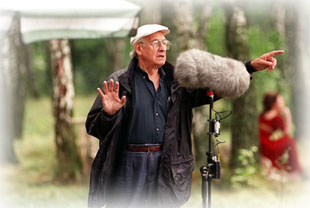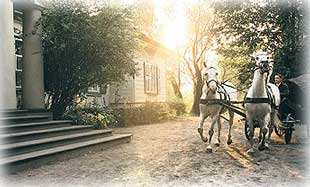
The Storyline and Context of Andrzej Wajda's film Pan Tadeusz
by Krystyna Rybicka and Peter K. Gessner
 Zosia |
The beautiful book-length poem Pan Tadeusz by Adam Mickiewicz is one of the masterpieces of Polish literature. Brought to the screen by Andrzej Wajda, this national epic is now accessible to a much larger audience, subtitles minimizing the linguistic barrier.
Mickiewicz wrote Pan Tadeusz as an emigré in Paris, and Wajda begins the film with Mickiewicz, in Paris, reading from the poem's Epilog.
A quintessentially Polish tale, Pan Tadeusz, set in the years 1811-1812, takes place in Lithuania. Today Lithuania is a small independent country with Lithuanian as its official language. But form 1388 to 1795, the Grand Duchy of Lithuania and the Kingdom of Poland formed a single Commonwealth ruled by one monarch. Over time, Polish became the prevalent language in the Grand Duchy whose inhabitants came to view themselves as Polish citizens of Lithuanian nationality, a view in which they persisted after the Grand Duchy was annexed by Russia when Poland was partitioned and vanished from the map of Europe in 1795.
 Andrzej Wajda directing Pan Tadeusz |
The film's plot centers on a feud between two families of Polish nobles: the Soplica and the Horeszko. It began when Jacek Soplica fell in love with Ewa Horeszko. He would visit her family's castle and was welcome there. However, when he asked her father for her hand in marriage, he was refused and Ewa was induced to marry someone else. Jacek took this badly.
On May 3rd 1791, Poland's parliament adopted a liberal Constitution. Those opposed to it met at Targowica and invoking the help of the Russians attacked the Constitution's supporters, among them the elder Horeszko who fought to defend his castle. In the melee of the Russian attack, Jacek Soplica spotted Horeszko and shot him dead. The Russians deported Ewa and her husband to Siberia where they perished. Their daughter, Zosia was left behind in the care of the Soplica family, to whom the Russians, perceiving them as helpful, assigned some of the Horeszko possessions. Thereafter, the Horeszko castle stood empty, guarded only by the steward Gerwazy. who had sworn revenge against Jacek Soplica.
Jacek married, but his wife died. Unable to come to terms with his vile deed, he entrusted his son, Tadeusz, to the care of his brother, Judge Soplica and left to join the Polish Legion, a unit in Napoleon's Army. It was made up of volunteers who saw in Napoleon the only military power likely to bring about Poland's liberation. Indeed, in 1807, having defeated Prussia at Jena, Napoleon created the Duchy of Warsaw from the Polish provinces that Prussia had annexed eleven years earlier. It was a Polish state in fact if not in name, a satellite of Napoleonic France, but none the less free.
The poem's action starts with the young Tadeusz returning from his studies to Soplicowo, the family manor, and with his unexpected and confusing meeting with Zosia. There are a lot of guests at the manor, their presence occasioned by a court hearing that is to decide on who is to inherit the Horeszko castle. The Count, a distant distaff relative of the Horeszko family, is one claimant, the Soplica family is the other.
 Kraysztof Kolberger in the role of Adam Mickiewicz |
The cast of characters in Soplicowo includes: the Judge Soplica, the comely "aunt" Telimena; Wojski, the manager of the Soplicowo estate; Protazy, a court clerk; and the officers of the court who have come to participate in the hearing, the main figure among them being the Chamberlain, who is there with his family. Others include the Notary and the Assessor, two amusing figures who continue to argue about the relative virtues of their respective dogs. A priest, Fr. Robak, a resident guest, is another important figure. Ostensibly he preoccupies himself with the collection of money for the poor, but in fact he is secretly organizing an armed action heralding Napoleon's arrival.
The action continues mainly along two intermingling story-lines. One is personal and romantic, presented with some humor. Telimena tries to seduce Tadeusz, who confused her with Zosia, but later, realizing his error, tries to extricate himself from the intrigue. Numerous tableaus, beautifully described by Mickiewicz, are presented in the film. These include mushroom gathering in the woods; the Count 's encounter with poultry-feeding Zosia, a bear hunt; and humorous scenes with Telimena: in her Temple of Dreams and her encounter with an ant-hill.
The other story-line is that of the feud between the Soplica and the Horeszko, now mostly propelled by the rivalry between Gerwazy and Protazy. While the guests are out for a walk, Protazy directs that the tables for dinner be transferred to the Castle, thereby upsetting Gerwazy. The latter regales the Count with the details of the origin of the feud, and suggests that the Count seek revenge. Then, when the lesser local nobility gathers in the tavern, Gerwazy incites them to attack the Soplica manor house, that is, to organize an armed foray, a time honored way of settling feuds.. Fr. Robak, and Jankiel, the tavern keeper, counsel restraint, as does Micha», an old warrior, but to no effect. Happily the Count has locked the Soplica family in the manor house and posted guards, causing the foray to degenerate into an attack on the cellar and the pantry. A general debauch follows.
 The Manor House at Soplicowo |
Someone summons the Russian military. Commanded by Major Plut and Captain Rykow, the latter friendly to the Poles, the Russians tie up the drunks. Subsequently Fr. Robak appears and plies the Russians with the spirits, getting them drunk and, in turn, leading a counter attack. In the ensuing fight, Major Plut is killed and the young Poles, Tadeusz and the Count, must escape across the border to the Duchy of Warsaw. Fr. Robak, mortally wounded, begins a confession with the shocking admission: "I am Jacek Soplica." Gerwazy, listening to his story, finally gives up thoughts of revenge.
Then comes the year 1812 and the arrival of Napoleon’s Grand Armée, its Polish units, and Tadeusz, now a cavalry officer, all on their way to Moscow. But the sense of freedom that permeates the air at the wedding of Zosia and Tadeusz is evanescent. The film ends, as it began, with many of the protagonists, now emigres in Paris, listening to Mickiewicz as he reads from his poem about the homeland to which they cannot return.
Page was first posted on the website of the Polish Arts Club of Buffalo
Andrzej Wajda and the filming of Pan TadeuszAdam Mickiewicz, Poet, Patriot and Prophet
| Info-Poland a clearinghouse of information about Poland, Polish Universities, Polish Studies, etc. |